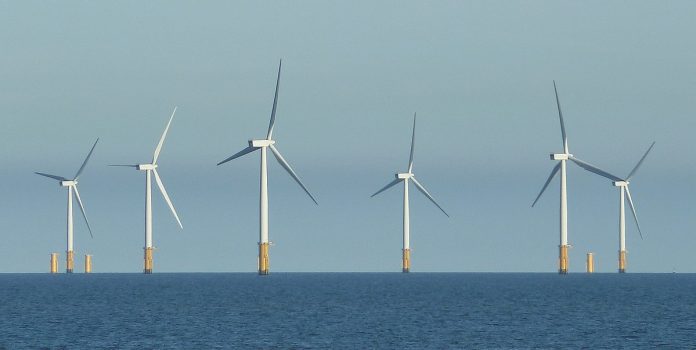Bipartisan federal legislation introduced in June proposes sharing a portion of any revenues generated by offshore wind industrial facilities erected in federal waters with coastal states impacted by the projects.
The Reinvesting in Shoreline Economies and Ecosystems (RISEE) Act is co-sponsored by Sens. Bill Cassidy (R-LA) and Sheldon Whitehouse (D-RI).
In addition to cutting states in on revenues generated from offshore wind turbines, the bill would also boost the amount of money coastal states receive from offshore oil and gas drilling. The legislation currently has ten co-sponsors.
Introduction of the legislation comes at a time when the Biden administration is seeking to raise offshore wind energy to 30 gigawatts by 2030, or roughly 1,000 times the amount being generated at present.
Money With Strings Attached
Under the RISEE Act, 50 percent of revenues generated by offshore wind facilities would go to coastal states adjacent to the sites, with the balance going to the U.S. Treasury.
Rather than coastal states being allowed to use the revenue generated by offshore wind development to meet the needs their respective legislatures or Governors think are most pressing, the revenue comes with strings attached.
The RISEE Act specifies revenue distributed to coastal states must be used for specific purposes set by the federal government. In particular, the revenue must be devoted to restoring coastal wetlands and shores, improving hurricane protection, and hardening infrastructure against flooding and extreme weather events. Under RISEE, states are also directed to devote some of the revenues they receive to offset damage to fish, wildlife, habitat, and the natural environment damaged by offshore wind development, and states are required to initiate or improve existing marine or coastal conservation-management plans.
The bill contains no provisions allowing states to use the revenues generated by federally approved offshore wind developments to offset any negative impacts the large groupings of wind turbines might have on tourism or the commercial and recreational fishing industries within each state.
‘Fair Share of … Revenues’
In press statements issued by several of the bill’s sponsors, each said the legislation was about helping coastal states reduce vulnerabilities to disasters.
“With climate change bearing down on us, coastal states like Rhode Island need vastly more resources to protect homes and businesses from rising sea levels and other increasingly urgent threats,” Whitehouse’s press release said. “Our bill will allow states to get a share of federal revenues from the growing offshore wind industry to make those investments.”
“This helps Louisiana and other states copy what we’re doing now with offshore energy revenues to rebuild our shoreline and protect our communities,” Cassidy said in a statement.
“Mississippi is a proud contributor to our nation’s energy independence,” said Sen. Roger Wicker (R-MS), another co-sponsor of the bill, in a news release. “This legislation would ensure that Gulf Coast states receive a fair share of energy revenues generated off our shores, so that we can continue to make investments to protect and preserve our coasts for future generations.”
Boosting OCS Revenues
With offshore wind energy revenue difficult to predict, the RISEE Act also encourages coastal states to acquiesce to the federal government’s offshore wind plans by amending the 2006 Gulf of Mexico Energy Security Act, to increase the revenue flow from offshore oil and natural gas development.
In enacted, four energy-producing Gulf states, Alabama, Louisiana, Mississippi, and Texas should see higher revenues as a result of provisions in the bill eliminating the state revenue-sharing cap, increasing the amount revenue from outer-continental shelf oil and gas development shared with states from 37.5 percent to 50 percent, and qualifying oil leases issued between 2000 and 2006 for future payment to Gulf Coast states; under current law only leases from 2007 to the present are eligible for revenue sharing.
The OCS revenue expansion might also be considered an effort to slow the revenue decline from future offshore oil and gas development, as the Biden administration delays or places moratoria on new leases and production from current leases decline.
Challenges Ahead
The United States currently has two offshore wind projects in operation, one off the coast of Rhode Island and the other, a pilot project off the coast of Virginia.
The Biden administration approved a large offshore wind project off the coast of Massachusetts in May, and dozens of other offshore wind projects, off coasts in the Northeast, Mid-Atlantic, and the Great Lakes, have been pitched to the administration and are various stages of planning or permitting.
Resistance from commercial fishing interests and various states’ tourism industries could delay or even block some of the projects, as they have done previously with proposals to expand offshore oil and gas production.
Although offshore wind blows with greater consistency than comparable onshore sites, it remains intermittent, making projections about both the number of homes and business reliably receiving power and the revenue generated by them difficult to accurately gauge, says Craig Rucker, president of the Committee for a Constructive Tomorrow (CFACT), co-publisher of Environment & Climate News.
“The people who sponsor this bill appear to be hedging their bets on just how much revenue their states will ultimately get from offshore wind,” said Rucker. “That’s why they took the opportunity to boost their share of revenue they receive from offshore oil and gas development. “Oil and gas have been good to them, and despite all the hoopla, offshore wind is a risky wager,” Rucker said.
Bonner R. Cohen, Ph.D., (bcohen@nationalcenter.org) is a senior fellow at the National Center for Public Policy Research and a senior policy analyst with CFACT.


























